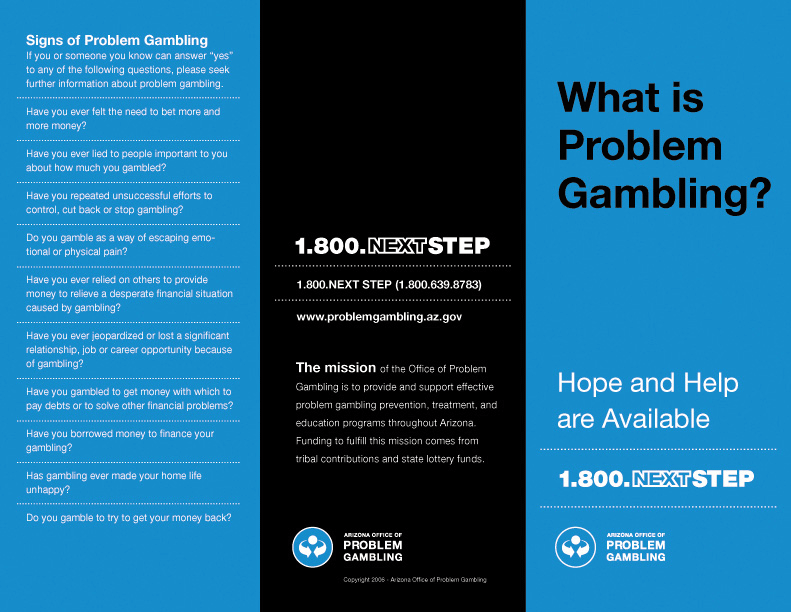Problem Gambling Information
If you recognize that you may have a problem with your gambling, talk with your primary care doctor about an evaluation or seek help from a mental health professional. To evaluate your problem with gambling, your doctor or mental health professional will likely: Ask questions related to your gambling habits. Problem gambling is an urge to gamble continuously despite negative consequences or a desire to stop. Problem gambling is often defined by whether harm is experienced by the gambler or others, rather than by the gambler's behaviour. Severe problem gambling may be diagnosed as clinical pathological gambling if the gambler meets certain criteria. Gambling addiction affects 1 to 3 percent of adults of all ages, men more often than women. It normally begins in adolescence in men and later in women. While casino and sports betting had been.
- Problem Gambling Information Articles
- Problem Gambling Information Brochures
- Problem Gambling Information Reporting
- Problem Gambling Information And Resources
- Problem Gambling Information
- Problem Gambling Information Websites
Problem Gambling Information Articles
Mission: To reduce the negative effects of gambling in Lane County communities through coordinating effective prevention strategies.
Our program history
Lane County formed its problem gambling (or “disordered gambling”) prevention program in January 2002. Since then, we have been called upon regionally, nationally and internationally for our resources and innovative prevention approaches. In 2012 our coordinator, Julie Hynes, was the recipient of the National Council on Problem Gambling’s Wuelfing Award for Prevention, the highest honor in problem gambling prevention. She is currently the co-chair of the National Council on Problem Gambling Prevention Committee.
Why the need to prevent gambling disorders?
- Disordered/problem gambling is a “hidden” behavioral addiction
- The latest data on Oregon students shows that gambling starts as early as sixth grade, and that youth who gamble are much more likely to be involved in other risky behaviors.
- Evidence-based efforts for drugs, alcohol and tobacco are effective; effective disordered gambling prevention strategies may actually help reduce the rate of future disordered gamblers by promoting healthy and responsible choices.
Evidence-based work

Our program, like other problem gambling services in the State of Oregon, is funded by a portion of 1% of Oregon Lottery net proceeds. We utilize the Center for
Substance Abuse Prevention’s (CSAP) strategies for effective prevention
efforts, including information dissemination, prevention education, community-based processes, and policy change.
A growing number of prevention experts believe that the risk and protective factors for other problem behaviors (e.g., substance abuse, violence, delinquency, school dropout) are common to those for problem gambling behaviors in youth. We very much support this belief. Therefore,
our program seeks to model its efforts around addressing common risk
factors.
Our program is targeting the following risk factors in youth:
Problem Gambling Information Brochures
- Early initiation of problem behavior
- Community laws & norms favorable toward the problem behavior
- Favorable attitudes toward the problem behavior
- Friends who engage in the problem behavior
Problem Gambling Information Reporting
For more information on how disordered/problem gambling may be related to the
risk & protective factor framework and how evidence-based disordered/problem
gambling prevention programs might be developed, please refer to the
report, Problem Gambling Prevention Resource Guide for Prevention Professionals.
Our goals
- Increase community awareness about the effects of disordered/problem
gambling, and promote awareness that disordered/problem gambling is a preventable and treatable public health problem - Reduce gambling behavior among youth by addressing the risk
factors that may increase the risk of disordered/problem gambling and promoting
the protective factors that may minimize the risk of problem
gambling. - Build and maintain partnerships of individuals, agencies, and
community groups to help support community approach to problem gambling prevention.
Lane County is working to achieve these goals through several projects, including the development and provision of educational material and technical assistance to schools and community partners, partnering with other local substance abuse prevention coordinators and other counties’ problem gambling prevention providers, and active involvement in local and statewide efforts.
For other information about our efforts, check out our presentation about problem gambling and the importance of prevention. Note that we’re constantly updating our materials, so the material on this site may not be as up to date as what we can provide to you.
Aligned with Oregon Health Education Standards
In schools, we align our efforts with the Oregon Health Education Standards.
The skills covered by our program include:
Problem Gambling Information And Resources

- accessing information, analyzing influences, and decision making.

How can we help you?
Are you looking to add information about problem gambling to your classroom, group, or agency program area? We can offer a variety material to you – – ranging from the shortest to lengthier material. Here are a few items we can offer you:

Problem Gambling Information
- Presentations and education, targeted to specific population needs
- Policy support and technical assistance
- Professional training workshops (e.g., to addictions, prevention, or mental health providers)
- Other gambling-related information or education; please feel free to contact us!